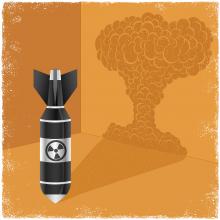threat

AS YOU READ this column, diplomats from the United States, the United Kingdom, France, Russia, China, Germany, and the European Union are working with their Iranian counterparts to finalize a deal concerning Iran’s nuclear program. I strongly believe that Christians should support the framework for this deal, announced in Lausanne, Switzerland, on April 2, as the best chance to prevent Iran from becoming a nuclear-armed state and—equally important—the best chance for the United States to avoid armed conflict with Iran.
In the days following the announcement of this framework, Sojourners authored and published a statement of support, which was signed by more than 50 Christian leaders (see statement here). Part of that statement reads as follows: “It is the sacred responsibility of all those entrusted with political power to pursue, with patient perseverance, every option that makes the destruction of war less possible, in order to protect human life and dignity. This becomes an even more urgent moral and spiritual imperative when we have the chance to prevent the further spread of nuclear weapons, with their terrifying potential of mass destruction ... a goal that reflects the binding commitments made by 191 U.N. member states, including the United States, under the Nuclear Non-Proliferation Treaty (NPT).”
IN FRANCE, about 70 percent of water services are privatized. French corporations continue to vie for control of the global water supply. But in 2010, Paris, in a case of “remunicipalization,” exited contracts with Paris-based Veolia and Suez Environnement, the world’s two largest water service companies.
Veolia is also the largest waste-water corporation in the world. Subsidiary Veolia Water North America is the largest private operator of U.S. municipal water and waste-water systems and controls the water service of about 14 million people.
The city of Jakarta, Indonesia, was recently confronted with a clean-water crisis as supplies run dry and a leaky system loses about 40 percent of its water. The city, with 10.9 million people, decided to buy back control of its water system in June from Suez Environnement.
Late Friday afternoon, UC Davis campus minister, the Rev. Kristin Stoneking, was in the car driving with her family from Davis to the American Academy of Religion gathering in San Francisco when she received a phone call from a campus administrator. Katehi was "trapped" inside her office at the university administration building, where a large crowd of protesters had gathered outside, flanking both sides of the sidewalk in front of the building's entrance. The chancellor was afraid to leave on her own and asked Stoneking to come mediate her exit with students.
Stoneking was running late, having missed a few of the AAR's sessions already, and was reluctant to heed the call. She called one of the students involved in organizing the Occupy protests on campus and learned that, "students were surrounding the building but had committed to a peaceful, silent exit for those inside and had created a clear walkway to the street." So she turned the car around and drove back to the university.
"Why did I walk the Chancellor to her car? Because I believe in the humanity of all persons," Stoneking writes. "Because I believe that people should be assisted when they are afraid. Because I believe that in showing compassion we embrace a nonviolent way of life that emanates to those whom we refuse to see as enemies and in turn leads to the change that we all seek. I am well aware that my actions were looked on with suspicion by some tonight, but I trust that those seeking a nonviolent solution will know that 'just means lead to just ends' and my actions offered dignity not harm."